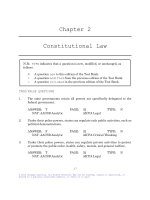Key aspects of german business law
Bạn đang xem bản rút gọn của tài liệu. Xem và tải ngay bản đầy đủ của tài liệu tại đây (3.74 MB, 438 trang )
Key Aspects of German Business Law
www.ebook3000.com
Michael Wendler ´ Bernd Tremml
Bernard Buecker (Eds.)
Key Aspects
of German Business Law
A Practical Manual
Third Edition
12
www.ebook3000.com
Michael Wendler
Wendler Tremml Rechtsanwålte
Mærsenbroicher Weg 200
40470 Dçsseldorf
Germany
Bernard Buecker
1220 Tower Life Building
310 S. St. Mary's
San Antonio, Texas 78205
USA
Dr. jur. Bernd Tremml, M. C. J.
Wendler Tremml Rechtsanwålte
Martiusstraûe 5/II
80802 Mçnchen
Germany
The information contained herein is general information and is not
intended to provide legal advide. Should you require legal advice, you
should seek the assistance of counsel.
Copyright ° 2006 Michael Wendler, Bernd Tremml, Bernard Buecker
ISBN-10 3-540-28422-2 Springer Berlin Heidelberg New York
ISBN-13 978-3-540-28422-2 Springer Berlin Heidelberg New York
ISBN 3-540-43411-9 2. Auflage Springer Berlin Heidelberg New York
Cataloging-in-Publication Data
Library of Congress Control Number: 2005938059
This work is subject to copyright. All rights are reserved, whether the whole or part of
the material is concerned, specifically the rights of translation, reprinting, reuse of illustrations, recitation, broadcasting, reproduction on microfilm or in any other way, and
storage in data banks. Duplication of this publication or parts thereof is permitted only
under the provisions of the German Copyright Law of September 9, 1965, in its current
version, and permission for use must always be obtained from Springer-Verlag. Violations
are liable for prosecution under the German Copyright Law.
Springer is a part of Springer Science+Business Media
springeronline.com
° Springer Berlin ´ Heidelberg 1999, 2002, 2006
Printed in Germany
The use of general descriptive names, registered names, trademarks, etc. in this publication does not imply, even in the absence of a specific statement, that such names are
exempt from the relevant protective laws and regulations and therefore free for general
use.
Hardcover-Design: Erich Kirchner, Heidelberg
SPIN 11543978
64/3153-5 4 3 2 1 0 ± Printed on acid-free paper
www.ebook3000.com
Preface
This book presents a clear and precise overview of the key aspects of German
business law. It was written by attorneys involved in the daily practice of business
law in Germany and is aimed at people who wish to orient themselves quickly
with the German legal system and the manner in which it impacts business
purchases, establishment, operations and liquidations.
The first section of the book is devoted to an explanation of the major issues to
be considered in acquiring or establishing a business in Germany. The second
section focuses on areas of commercial law that are important for an operating
business. The following sections deal with labor law as an independent part of
German business law and with computer law. Furthermore, procedural law and
European law are addressed. Finally, the last two sections of the book are devoted
to an overview over the German tax law, which has an enormous impact on
business decisions, and IP law. In all sections special attention has been paid to
highlighting and explaining the differences between the German legal system and
that of the United States. Nevertheless, the intention is to provide information that
will prove valuable to all foreigners, particularly business men and women and
lawyers advising clients with an interest in doing business in Germany.
Although it is the object of this book to provide readers with a general
orientation and the foundation for making informed decisions concerning business
transactions in Germany, it cannot possibly function as a substitute for casespecific professional advice and by no means purports to do so. Those readers who
wish to follow up on any decisions they may have formed on the basis of the
material presented here are well advised to seek the guidance of qualified
attorneys and tax advisors before entering into any binding obligations.
This holds particularly true in light of the fact that all information here is based
on the laws that were in effect in the Federal Republic of Germany on the first of
November 2005.
Michael Wendler
Attorney at Law
Dusseldorf, Germany
Bernd Tremml
Attorney at Law
Munich, Germany
www.law-wt.de
www.ebook3000.com
Bernard Ben Buecker
Attorney at Law
San Antonio, Texas
Table of contents
Introduction ...........................................................................................................1
Overview of the German legal system and its role in light of Germany’s
membership in the European Communities.............................................................3
Bernd Tremml
Part I How to establish or acquire a business in Germany................................7
Recognized forms of business organizations...........................................................9
Bernd Tremml and Bernard Buecker
Establishment of a company or branch office .......................................................35
Thomas Fischl
The Acquisition of closely held Companies..........................................................41
Bernd Tremml
Valuation of business enterprises ..........................................................................57
Bernd Tremml
“Pseudo-foreign companies” in Germany - The Centros, Überseering
and Inspire Art decisions of the European Court of Justice...................................63
Kai F. Sturmfels
Part II Commercial law ......................................................................................69
The law of contracts ..............................................................................................71
Michael Luber
General terms of business (AGBs) ........................................................................85
Andreas Stadler and Michael Luber
Torts ......................................................................................................................97
Tobias Tremml
Product liability under German and European law..............................................111
Ralf Grote
Real-estate property law Germany ......................................................................121
Christian R. Wolf
www.ebook3000.com
VIII
Table of contents
The law of bankruptcy and security interests ...................................................... 131
Reinhard Nacke
Unfair competition .............................................................................................. 141
Henrik Schroeder
The law of public procurement ........................................................................... 149
Norman Müller
Distribution agreements ...................................................................................... 165
Michael Bihler
Private public partnerships .................................................................................. 179
Richard Pietrzyk and Kai F. Sturmfels
Copyright............................................................................................................. 187
Carsten Gerlach
Part III Labor law ............................................................................................. 203
Aspects of German labor law .............................................................................. 205
Wolf D. Schenk
Residence and work permit ................................................................................. 219
Michael Wendler and Sebastian Maiß
Essentials of social security law in the Federal Republic of Germany................ 231
Richard Pietrzyk and Sebastian Maiß
Part IV Computer law ...................................................................................... 235
Computer law ...................................................................................................... 237
Michael Karger
Electronic commerce........................................................................................... 245
Raimund Walch
Protection of internet domain names ................................................................... 251
Wolfgang C. Leonti and Henrik Schroeder
Part V Procedural law ...................................................................................... 257
Enforcement of rights and claims through the courts and arbitration
tribunals/The German attorney fees .................................................................... 259
Reinhard Nacke
www.ebook3000.com
Table of contents
IX
Principles of the legal regulation of attorney fees ...............................................267
Stefan Sandrock
Notaries in Germany ...........................................................................................277
Christian R. Wolf
Part VI European law .......................................................................................287
Institutions of the European Community.............................................................289
Bernd Tremml
Antitrust law in the European community...........................................................301
Bernd Tremml and Michael Luber
Part VII Tax law................................................................................................311
German tax law ...................................................................................................313
Inge Badura
Part VIII IP........................................................................................................327
The PCT and the enforcement of patents in Europe............................................329
Kay Rupprecht
Trademark protection in Germany and Europe ...................................................377
Eugen Popp
List of authors....................................................................................................437
www.ebook3000.com
Glossary of German terms and abbreviations
A
Abgabenordnung (AO)
Tax Code
Abstraktionsprinzip
abstraction principle
Abtretung
assignment
Allgemeine Geschäftsbedingungen
(AGB)
General Terms of Business
Amtsblatt der Europäischen
Union
Official Journal of the European Union
Amtsgericht
Court of Small Claims; municipal court
Änderungskündigung
a termination of a contract with the reserved
right to renew it under altered conditions
Änderungsvertrag
contract of amendment
Angestellte
employees; salary earners; “white collar”
workers
Aktiengesellschaft (AG)
stock corporation
Aktiengesetz (AktG)
Corporation Act
Aktionär
stockholder (of a stock corporation)
Aktie
a share of stock; stock certificate
Arbeiter
laborers; “blue collar” workers
Arbeitserlaubnis
work permit
Arbeitserlaubnisverordnung
(AEVO)
Work Permit Regulations
Arbeitsförderungsgesetz (AFG)
Work Promotion Act
Arbeitsgerichtsgesetz (ArbGG)
Code of Labor Procedure
Arbeitslosenversicherung
occupational incapacity insurance
Arrest
Freeze Order
Arzneimittelgesetz
(ArzneimittelG)
Pharmaceutical Products Act
Aufenthaltserlaubnis
temporary residence permit
www.ebook3000.com
XII
Glossary of German terms and abbreviations
Aufenthaltsgesetz
Federal Residence Act
Aufsichtsrat
supervisory board of a company or
corporation
Ausländer
foreigner; alien
Ausländergesetz (AuslG)
Aliens Act
Ausländeramt
Aliens Office
Außenministerium
Department of Foreign Affairs
Außenwirtschaftsgesetz
Federal External Trade Act
B
Begehungsgefahr
danger of commission of an offense
Bergamt
mining authorities
Berufsgenossenschaft
administrative authorities in charge of providing social insurance due to occupational
accidents
Berufungsverfahren
appellate proceedings (to the next higher
court)
Beschäftigungsverordnung
(BeschV)
Employment Regulation Order
Betriebsaufgabe
abandonment of a business enterprise
Betriebsrat
works council
Betriebsstätte
operational location (dependant branch
offiche)
Betriebsverfassungsgesetz
(BetrVG)
Employee Representation Law
Bezirk
district
BGB-Gesellschaft
see Gesellschaft des bürgerlichen Rechts
BGB-InfoV
Federal Ordinance on the Duty to Provide
Information to the Consumer
Bilanzrichtliniengesetz
commercial balance sheet
Bilanzrichtliniengesetz
Accounting Directives Act
Bundesagentur für Arbeit
Federal Employment Office
www.ebook3000.com
Glossary of German terms and abbreviations
Bundesarbeitsgericht
Federal Labor Court
Bundesministerium für Arbeit und
Soziale Sicherung
Federal Department of Labor and Social
Order
Bundesfinanzhof
Federal Finance Court
Bundesgerichtshof (BGH)
Federal Supreme Court
Bundeshaushaltsordnung
Federal Budget Code
Bundesimmissionsschutzgesetz
(BImSchG)
Federal Emission Act
Bundeskartellamt
Federal Cartel Authority
Bundesrechtsanwaltsordnung
(BRAO)
German Bar Act
Bundesrechtsanwaltsgebührenordnung (BRAGO)
Attorneys’ Fee Ordinance
Bundespatentgericht
Federal Patent Court
Bürgerliches Gesetzbuch (BGB)
Civil Code
Bürge
guarantor
Bürgschaft
surety or personal guarantee
Bundesverfassungsgericht
Federal Constitutional Court
XIII
D
Darlehen
loan intented for consumption (normally a
monetary loan)
Delikt
tort, (compensatory) unlawful act
Deutsche Angestelltengewerkschaft White Collar Union
Deutscher Beamtenbund
Civil Servants’ Union
Deutsche Bundesbank
Federal Reseve Bank of Germany
Deutscher Gewerkschaftsbund
(DGB)
German Association of Industrial Labor
Unions
Dienstvertrag
contract for services (without any promise of
specific result, as opposed to a Werkvertrag
dinglicher Vertrag
real contract
www.ebook3000.com
XIV
Glossary of German terms and abbreviations
dispositives Gesetzesrecht
non-mandatory statutory law
Duldung
residence toleration
Durchführungsverordnung zum
Ausländergesetz (DVAuslG)
Implementation Ordinance of the Aliens Act
E
Einfuhrumsatzsteuer
import turnover tax
Einführungsgesetz zum BGB
(EGBGB)
Introductory Act to the Civil Code
Einigungsgebühr
settlement fee
Einkommenssteuer
personal income tax
Einkommenssteuergesetz
Income Tax Act
einstweilige Verfügung
(preventive) injunction
Einzelunternehmen
sole proprietorship
Entscheidungen des Bundesgericht- Decisions of the Federal Court for Civil
shofs in Zivilsachen (BGHZ)
Cases
Entsendung
posting
Erbbaurecht
Inheritable Building Right
Erbrecht
Inheritance law
Erbschaftssteuer
Inheritance and gift tax
Erfolgshonorar
contigent fee
Erstbegehungsgefahr
danger of first-time commission of an offense
Europäische Gesellschaft
societas europaee (SE), European stock corporation
Europäisches Patentamt
European Patent Office
Europäische Wirtschaftliche Interessenvereinigung (EWIV)
Business for multinational enterprises comparable to the general partnership
Europäischer Gerichtshof (EuGH)
European Court of Justice (ECJ)
Europäischer Wirtschaftsraum
(EWR)
European Market
Glossary of German terms and abbreviations
XV
F
Fernabsatzgesetz
Act on Distant Sale Contracts
Fernstraßenbaufinanzierungsgesetz
Private Highway Construction Financing
Act
Finanzamt
tax office; tax authorities
Firma
legally: corporate name
Freizügigkeitsgesetz/EU
Freedom of Movement Act/EU
G
Gebührensatz
rate of charges/fee rate
Gebührenvereinbarung
fee agreement
Gefährdungshaftung
no-fault tort liability
Gegenstandswert
value of the subject matter
Gemeinde
community or municipality
Gentechnikgesetz (GenTG)
Genetic Technology Act
Geräte- und Produktsicherheitsgesetz (GPSG)
Equiptment and Products Safety Act
Gerichtskostengesetz (GKG)
Court Costs Act
Gerichtsvollzieher
sheriff’s officer (official debt collector)
Gesamtbetriebsrat
combined or overall works council (of more
than one business unit)
Gesamthandsvermögen
joint ownership (of the property of a partnership)
Geschäftsbesorgungsvertrag
contract for business services
Geschäftsführung ohne Auftrag
settlement of a third partyßs legal obligations without a contract
Geschäftsgebühr
fee for out-of-court work
Gesellschaft des bürgerlichen
Rechts (GbR)
(also: BGB-Gesellschaft) civil-law partnership
Gesellschaft mit beschränkter
Haftung (GmbH)
limited liability company
XVI
Glossary of German terms and abbreviations
Gesellschafter
shareholder (in a limited liability company)
Gesellschafterversammlung
shareholder meeting (limited liability company)
Gesellschaftsvertrag
articles of incorporation
Gesetz
law or act
Gesetz gegen Werbung auf dem
Gebiet des Heilwesens
Law against Advertising in the Health-Care
Sector
Gesetz gegen den unlauteren
Wettbewerb (UWG)
Unfair Competition Act
Gesetz gegen Wettbewerbsbeschränkungen (GWB)
Act Prohibiting Restrictions of Competition
Gesetz über den Vertrieb
ausländischer Investmentanteile
(AuslInvestmG
Law on Foreign Investment Shares
Gesetz zur Regelung des Rechts der Law for the Regulation of General Business
Allgemeinen Geschäftsbedingungen Terms
(AGBG)
Gewerbeaufsichtsamt/
Gewerbeamt
Trade Supervision Office
Gewerbeordnung (GewO)
Trade Supervision Law
Gewerbesteuer
trade tax
Gläubiger
creditor
Gläubigerversammlung
creditor´s meeting (in an insolvency proceeding)
Gläubigerverzug
delay of the creditor
GmbH & Co KG
business organizational form which is a
combination of a limited liability company
and a limited partnership
GmbH-Gesetz (GmbHG)
GmbH Act (law governing limited
liability companies)
Gründungstheorie
incorporation theory (of business enterprises)
Grundbuch
land register at the local court
Grunderwerbssteuer
real estate transfer tax
Glossary of German terms and abbreviations
Grundpfandrecht
Real-estate mortgages
Grundsätze ordnungsgemässer
Buchführung
principles of proper accounting
Grundsteuer
real estate/property tax
XVII
H
Haftpflichtgesetz (HaftpflG)
Liability Act
Haftungsausschluss
total exemption from liability
Haftungsbeschränkung
limitation of liability
Handelsgesetzbuch (HGB)
Commercial Code
Handelsgewerbe
commercial trade enterprise (owned and
operated by individuals who are merchants
by profession). Governed by the HGB.
Handelsregister
commercial register
Handlungsvollmacht (see also: Pro- full power of attorney (to represent an enterkura)
prise)
Handwerksordnung
Handicrafts Code
Hauptfürsorgestelle
Head Office for Public Assistance
Hauptniederlassung
company headquarters, main or head office
Hauptversammlung
stockholder meeting (stock corporation)
I
Industriegewerkschaft (IG)
industrial trade union
Industrie- und Handelskammer
(IHK)
Chamber of Industry and Commerce
Informations- und Kommunikationsdienstegesetz (IuKDG)
Federal Information and Communication
Service Act
Inhaberaktie
bearer stock certificate
Insolvenzordnung
Federal Insolvency Act
Insolvenzplan
insolvency plan
Insolvenzverwalter
insolvency administrator
XVIII
Glossary of German terms and abbreviations
Interessenausgleich
compromise on issues of disagreement involving conflicting interests (for example, of
employers and employees)
Investmentgesetz
Investment Act
K
Kapitalerhaltungsregeln
rules on capital maintenance
Kapitalertragssteuer
capital-yield/Withholding tax.
Kapitalspiegelmethode
literally: capital-mirroring method. The
reflection of the actual net value of a partnership in its fiscal balance (as opposed to
using the purchase price as the means of
measure).
Kaufmann
merchant
Kausalitätsvermutung
assumption of causation in regard to tort
liability
Kommanditgesellschaft (KG)
limited partnership (for merchants)
Kommanditgesellschaft auf Aktien
(KGaA)
limited partnership combined with stock
Kommanditist
limited partner (in a Kommanditgesellschaft)
Komplementär
general partner; personally liable partner
(in a Kommanditgesellschaft)
Konkurs
bankruptcy
Konkursordnung (KO)
Bankruptcy Act
Kontrahierungszwang
obligation to enter into contracts
Kostenordnung (KostO)
Cost Regulation (for notary fees)
Kostenrechtsmodernisierungsgesetz Legal Costs Modification Act
(KostRMoG)
Körperschaftssteuer
corporate income tax
Krankenversicherung
private health care insurance
Kreditwesengesetz (KWG)
Lending Business Act
Kündigungsschutzgesetz (KSchG)
Termination Protection Act
Glossary of German terms and abbreviations
XIX
L
Ladenschlussgesetz
Store Closing Hours Act
Laienrichter
lay judges
Landgericht
Regional Court
Landkreis
county (approx. equivalent)
Leasingvertrag
leasing contract
Lebensmittel- und Bedarfsgegenständegesetz
Food and Essential Commodities Law
Leihe
gratuitous loan
Leitende Angestellte
senior executives; managerial employees
(with the ability to hire and fire); literally:
leading employees
Lohnsteuer
wage tax
M
Mahnverfahren
summary proceeding for debt collection
Markengesetz
Trademark Act
Mehrwertsteuer
(MwSt) (also: Umsatzsteuer) value-added
tax (VAT)
Mehrwertsteuergesetz (MwStG)
Value-Added Tax Act
Miete
rent
Minderkaufmann
small merchant
Mitbestimmungsgesetz
(MitbestG)
Co-Determination Law enabling employee
representation in a company’s management
Montan-Mitbestimmungsgesetz
Coal-and-Steel Co-Determination Law
Mutterschutzgesetz (MuSchG)
Maternity Protection Act
XX
Glossary of German terms and abbreviations
N
Namensaktie
registered stock
Niederlassung
branch office
Niederlassungserlaubnis
permanent settlement permit
Niederlassungsfreiheit
right of establishement of companies
Nießbrauch
usufruct
Notar
notary
O
Oberfinanzdirektion
superior finance directorate
Oberlandesgericht
court of appeals
Offene Handelsgesellschaft (OHG)
general partnership (for merchants)
ÖPP-Beschleunigungsgesetz
Private-Pubilc-Partnerships Acceleration
Act
P
Pacht
leasing (of an establishment or a real
property)
Patentanwalt
Patent Attorney
Pariser Verbandsübereinkunft
Paris Convention
Partnerschaftsgesellschaft
Professional Partnership
Personengesellschaft
partnership
Pflegeversicherung
long-term care insurance
Preisangabenverordnung (PAngV)
Price Indication Regulation
Produkthaftungsgesetz
Product Liability Act
Prokura
full power of attorney enabling company
representation by an employee
Glossary of German terms and abbreviations
XXI
R
Rahmengebühr
lum-sum fee with an upper and lower limit
Recht der Leistungsstörungen
law of irregularities in performance
Rechtsanwalt
attorney at law
Rechtsanwaltsvergütungsgesetz
(RVG)
Attorney Remuneration Act
Rechtspersönlichkeit
legal personality or nature (of a business
venture)
Rentenversicherung
retirement pension insurance
Repräsentanz
representative organization
Restschuldbefreiung
discharge of remaining debt (in an insolvency proceeding)
Revisionsverfahren
appellate proceedings (to the highest court
for judicial grounds)
Richterrecht
judicial law
S
Sachverständiger
public-appointed experts
Satzung
articles of incorporation of a stock corporation
Schachtelbeteiligung
intercorporate participation; mutual stockholding
Scheinauslandsgesellschaft
pseudo-foreign company
Schuldner
debtor
Schuldnerverzug
delay of the debtor
Selbstbelieferung
the ability to procure goods oneself
SE-VO
European Stock Corporation (SE) Implementation Regulation (VO)
Sitztheorie
real seat theory (of business enterprises)
Solidaritätszuschlag
solidarity contribution/surcharge
Sozialgesetzbuch (SGB)
Federal Public Welfare Act
XXII
Glossary of German terms and abbreviations
Sozialversicherung
social insurance
Sozialversicherungspflicht
compulsory social insurance
Stammaktie
common stock
Stammkapital
nominal capital of a business enterprise
Steuer
tax
Steuerberater
tax advisor
Stille Gesellschaft
silent or dormant partnership
Stuttgarter Verfahren
Stuttgart Procedure (a way of assessing the
value of a business, which was once the
standard procedure in Germany but has recently fallen out of use due to its inaccuracy
pitfalls)
T
Terminsgebühr
appointment fee
U
Überschuldung
excessive indebtedness
Umsatzsteuer
value-added tax (VAT). Literally: sales tax.
Umwandlung
transformation of a business enterprise from
one organizational form to another
Umwelthaftungsgesetz (UmweltHG)
Environmental Liability Act
Unbedenklichkeitsbescheinigung
clearance certificate
unerlaubte Bereicherung
undue benefit
unerlaubte Handlung
unlawful conduct
Unfallversicherung
accident insurance
Unterlassungsklagengesetz
law enabling the filing of suits for discontinuance of using unlawful general terms of
business
Urhebergesetz (UrhG)
Copyright Act
Glossary of German terms and abbreviations
XXIII
V
vereidigter Buchprüfer
certified bookkeeper
Verfahrensgebühr
litigation fee
Verfassung
Constitution
Vergabeverordnung (VgV)
Regulation on the Award of Public
Contracts
Vergütungsverzeichnis (VV)
Catalogue of Fees for Legal Services
Vermögenssteuer
Wealth tax
Vermögensübertragung
transfer of corporate assets and liabilities
into public ownership
Verschmelzung
corporate merger
Verschmelzung durch Aufnahme
take over; a merger with at least one other
company
Verschmelzung durch Neubildung
consolidation of one corporation with
another for the purpose of forming an
entirely new corporation
Versicherungsaufsichtsgesetz
(VAG)
Insurance Supervision Act
Versicherungsvertragsgesetz
Insurance Act
Vertrags- und Vergabeordnung
für Bauleistungen (VOB)
regulation for standard terms for contracting
construction work
Verwaltungssitz eines
Unternehmens
principle place of business
Vorschuß
retainer
Vorstand
board of management
Vorzugsaktien
preferred stock
W/X/Y/Z
Wasserhaushaltsgesetz (WHG)
Water Conservation Act
Werkvertrag
contract for work and labor promising a
specific result
Wertgebühr
fee based on case value
www.ebook3000.com
XXIV
Glossary of German terms and abbreviations
Wettbewerbshandlung
competitive act
Wettbewerbsrecht
Law on competition
Widerrufsrecht
revocation right
Wiederholungsgefahr
danger of repetition of an offense
Wirtschaftsprüfer
certified public accountant (CPA)
Wohnungseigentum
condominium
Zivilprozessordnung (ZPO)
Code of Civil Procedure
Zug-um-Zug-Leistung
mutual simultaneous performance
Zwangsvertrag
compulsory contract
Zweigniederlassung
independent branch office
Introduction
Overview of the German legal system and its role
in light of Germany’s membership in the
European Communities
Bernd Tremml
Foreigners interested in starting a business or investing in German companies are
generally attracted by the prospect of expanding into other European markets.
Germany’s membership in the European Communities (EC) is a beneficial factor
when deciding whether to invest in Germany, especially, because of the recent
broadening of the EC. However, there also have been concerns about the
implications of the dual European and German legal systems. Investors may
wonder whether a German venture requires familiarization with two, oftenconflicting bodies of law, or if businesses in Germany frequently have to deal with
administrative authorities at both the national and international level with regard
to the same transaction. The answer to such questions is “no”. Given the structure
of the EC and particularly the manner in which EC institutions pass laws, an
investment in Germany does not place investors in a legal quagmire.
As a fundamental principal, the EC and its institutions possess the power to
pass legislation in only those areas in which an express delegation of national
authority exists. For this reason alone, large numbers of regulatory areas remain
outside of the EC’s control. For example, most civil, criminal, and administrative
laws remain the sole province of the Member States. In general, the EC’s authority
is limited to those regulatory areas, which are essential to the establishment of a
common market. Furthermore, the laws that have been passed by the EC tended to
take the form of “directives.” As will be explained in detail in the Chapter entitled
“Institutions of the EC”, directives do not, as a general principal, take effect until
after they have been incorporated into national law. This special characteristic of
directives is intended to give the Member States the flexibility of choosing the
manner in which a directive becomes law in their own country. Accordingly,
Member States can choose a directive that is most compatible with their particular
legal system. For individuals and business enterprises alike, it is often not easy to
recognize whether or not a national law is based on a European directive. In sum,
EC directives do not constitute an overlay of regulations which investors must
familiarize themselves with, but rather comprise an integral part of a Member
State’s national law.
Much the same applies to those areas in which the EC has enacted a type of
legislation known as a “regulation”. A regulation does not require incorporation
into national law in order to be effective, but as a rule is implemented by the
national authorities. For example, if a German administrative authority applies an
EU regulation in its dealings with German residents and they feel an error has
occurred, action can be taken only against the national authority and, in doing so,
4 Bernd Tremml
such action usually operates solely within the German administrative or judicial
systems.
For these reasons, the direct effect of EC law on German residents or
businesses is relatively small. However, that is not to say, that the EC’s influence
should be downplayed. The numerous areas of law impacting the establishment
and operation of businesses in Germany are often reflective of EC law.
Nevertheless, for the most part EC laws have been incorporated into national law
and are subject to Germany’s legal system. It is within this system that foreign
investors will predominantly conduct their business transactions.
For the most part, Germany’s legal system is stable and smooth working. It is
based on the Continental European legal tradition as opposed to Anglo-Saxon law
upon which the U.S. legal system is based. The primary difference between the
two systems is that the Continental European legal system is based on “code law’
as opposed to “case law”. In accordance with the Continental tradition, the
German legal system consists essentially of written laws. Nearly all potential
regulatory areas are the subject of formal and detailed codification. Many of
Germany’s legal codes are the final product of decades of careful deliberation and
refinement. This offers foreign entrepreneurs and investors considerable
advantages. German law is so clearly structured and transparent that contract
terms can be standardized to a very large extent. All the standard practices and
regulations governing a business’s conduct are codified in the German Civil Code
(BGB, or Bürgerliches Gesetzbuch). Therefore, if no special terms are agreed upon
between the parties, the terms and provisions of the BGB automatically apply. In
other words, in the U.S., business contracts require the clear and detailed
statement of all the terms the parties agree to. Contracts in Germany tend to be
considerably shorter, which lowers their drafting costs accordingly.
German law has undergone numerous reforms in recent years, which, for the
most part, have had a very positive impact on business activities, even though
there have been some less favorable developments. The Commercial Code was
liberalized by broadening the definition of “merchant”, thus, making it easier for
people to get started in business. Additionally, the Handcrafts Code (Handwerksordnung) was modified to make it easier to demonstrate professional qualification.
Business activities in the domestic market were also facilitated through a
considerable loosening of the laws regulating unfair trade.
On the other hand, disadvantageous are the new regulations in contract and
civil process law. Contract law now ensures an extraordinary high degree of
consumer protection at the expense of merchants. Furthermore, the extent and
complexity of the reforms have led to a certain degree of legal confusion. The
changes made in civil process law make it more difficult to acquire access to
appellate courts, which very often necessitates cost-and-effort intensive
proceedings right from the start.
As in the U.S., it is the task of the courts to interpret the written law. Because a
number of German codes are more than a hundred years old, the case law
pertaining to certain individual provisions of them is very extensive. The courts
have the primary task of interpreting the statutes, regulations, and Constitution,
and they also play a role in filling in the gaps of laws where necessary. However,
Overview of the German legal system 5
the reliance on precedence plays a much smaller role in the German legal system
than in American jurisprudence, since German laws are explicitly detailed and
codified.
The sharp differentiation between the various areas of law in Germany and the
separate codification of them have led to a strict division of subject-matter
jurisdiction among the different types of courts. As in the U.S., there are separate
civil courts responsible for deciding legal disputes among private persons, and
there are criminal courts for criminal prosecutions brought by the State against
individuals. In contrast to the U.S. legal system, there are also separate court
systems for administrative matters or legal disputes involving measures taken by
public authorities against residents and for labor-law and financial matters.
Germany has a special body of law governing taxation and a court system
specialized in trying tax cases as well. It should also be noted that, in contrast to
the U.S. judicial system, there is no duality between state and federal courts. In
Germany, their areas of jurisdiction are clearly kept separate. Each of the various
court systems has its own supreme court. The Constitutional Court is the final
authority.
The judges who serve on the courts are judges by profession and are specialized
in one type of law. They do not rotate from one type of court to another as U.S.
judges do, but generally serve on only one type of court throughout their careers.
They are not elected but rather appointed by the government of the particular state
of Germany where the court is located. Germany does not make use of the jury
process. However, in certain cases the judges are assisted in making their
decisions by common citizens who do not necessarily have a legal background of
any kind (Laienrichter/lay judge) and who are chosen to serve on the court for a
limited time period.
Regardless of which type of court is handling a particular dispute, the parties’
trial preparation consists primarily in the drafting and presentation of legal briefs
in which evidence is presented and the issues in dispute are argued. In doing so,
the parties rely on the court’s special procedural rules. Each type of court has its
own rules, such as determining case procedure, the kind of evidence it will admit,
etc. The courts make extensive use of independent public-appointed experts
(Sachverständiger), whose professional input almost always influences the ruling
to a very large extent and often determines the outcome of a case. Due in part to
the judicial system’s reliance on the parties’ briefs, the reports of independent
experts and other written submissions, the trial itself (in particular the in-court
presentation of live testimony and other evidence) takes considerably less time
and involves less costs than U.S. court proceedings. This will be discussed
extensively in Chapter “Enforcement of Rights and Claims”. With the exception
of criminal cases, most trials last no longer than one or two days.
An overview of Germany’s legal system would not be complete without a few
comments about the governmental administrative apparatus. The Federal Republic
of Germany is, as its name expresses, a federal state. That means that legislative
powers are divided between the federal government and each of the country’s
sixteen states. The most important areas of law are the exclusive domain of the
federal government. However, because individual states of Germany are generally









